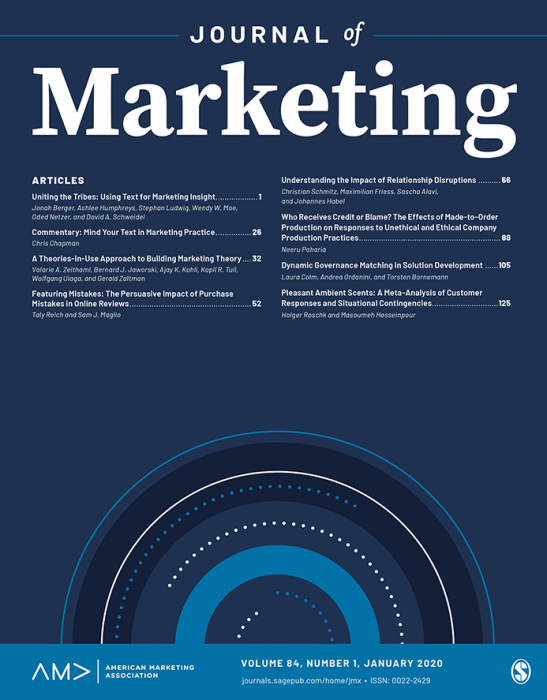EXPRESS: Dynamic Effects of TV Ad Suspension on Keyword Search: Evidence from the U.S. Telecom Industry
IF 10.4
1区 管理学
Q1 BUSINESS
引用次数: 0
Abstract
This paper investigates the dynamic effects of temporarily suspending TV ads on online keyword search through a large-scale quasi-experiment in the U.S. wireless telecom industry. One top carrier, which spends stably around one million USD per day on TV advertising, halted its TV ads for a randomly selected week over our (6-month) study window. The primary challenges in this event study — continuously changing treatment variables and establishing valid control groups to account for time-varying confounders—are addressed using the generalized synthetic control estimator (GSC). Findings reveal significant immediate and lasting declines in the focal brand’s search volume, with reductions of 5-15% per day persisting for two weeks after TV ads resumed. The effects varied significantly across search categories: informational searches related to TV ad content experienced drops of up to 30% per day but recovered more quickly, while navigational searches showed smaller but more prolonged declines. Furthermore, the intervention had modest, short-lived spillover effects on three competitors. Interestingly, the suspension tended to hurt the competitor most similar to the focal brand, while benefiting leading competitors. These spillover effects were particularly pronounced in informational and channel searches, suggesting that competitors’ visibility was significantly affected by the focal brand’s absence.电视广告暂停对关键词搜索的动态影响:来自美国电信行业的证据
本文通过在美国无线通信行业进行的大规模准实验,研究了暂停电视广告对在线关键字搜索的动态影响。一家顶级运营商每天在电视广告上的花费稳定在100万美元左右,在我们(6个月)的研究窗口中随机选择了一个星期停止了电视广告。本事件研究的主要挑战-持续改变治疗变量和建立有效的对照组以解释时变混杂因素-使用广义综合控制估计器(GSC)解决。调查结果显示,焦点品牌的搜索量立即且持续下降,在电视广告恢复后的两周内,每天的搜索量下降了5-15%。不同搜索类别的影响差异很大:与电视广告内容相关的信息搜索每天的下降幅度高达30%,但恢复得更快,而导航搜索的下降幅度较小,但持续时间更长。此外,干预对三个竞争对手产生了适度的、短暂的溢出效应。有趣的是,暂停往往会伤害与焦点品牌最相似的竞争对手,同时使领先的竞争对手受益。这些溢出效应在信息和渠道搜索中尤为明显,这表明竞争对手的知名度受到焦点品牌缺席的显著影响。
本文章由计算机程序翻译,如有差异,请以英文原文为准。
求助全文
约1分钟内获得全文
求助全文
来源期刊

Journal of Marketing
BUSINESS-
CiteScore
24.10
自引率
5.40%
发文量
49
期刊介绍:
Founded in 1936,the Journal of Marketing (JM) serves as a premier outlet for substantive research in marketing. JM is dedicated to developing and disseminating knowledge about real-world marketing questions, catering to scholars, educators, managers, policy makers, consumers, and other global societal stakeholders. Over the years,JM has played a crucial role in shaping the content and boundaries of the marketing discipline.
 求助内容:
求助内容: 应助结果提醒方式:
应助结果提醒方式:


